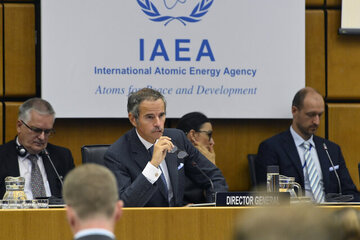Grossi made the remarks during a meeting of the IAEA Board of Governors in Vienna on Monday.
The IAEA chief claimed that the agency’s verification and monitoring of the 2015 nuclear deal, called the Joint Comprehensive Plan of Action (JCPOA), has been constrained by Iran’s decision in February 2021 to suspend its commitments under the nuclear accord.
Iran has scaled back its commitments under the JCPOA in several phases, starting a year after the US unilaterally withdrew from the deal in 2018 and re-imposed its sanctions against the country.
Grossi said “no further progress” has been made in implementing the safeguards activities outlined in a joint statement issued on March 4.
Grossi was referring to his visit to Tehran in March, when he held high-level talks with Iranian officials, including with President Ebrahim Raisi, in an effort to resolve the outstanding disagreements with the agency.
In a joint statement after the visit, the two sides agreed that interactions would continue in a spirit of collaboration and in full conformity with obligations under a comprehensive Safeguards Agreement.
Addressing the Board of Governors on Monday, Grossi said that the outstanding safeguards issues must be resolved so that the IAEA can guarantee the peaceful nature of Iran's nuclear program.
Safeguards questions about Iran’s nuclear program were raised four years ago when the IAEA opened a new case against the country based on fake documents provided by the Israeli regime, alleging uranium traces at four undeclared locations in Iran.
These allegations were initially made by Israeli prime minister Benjamin Netanyahu and subsequently echoed by Western media and officials.
Iran has rejected the allegations.


Your Comment